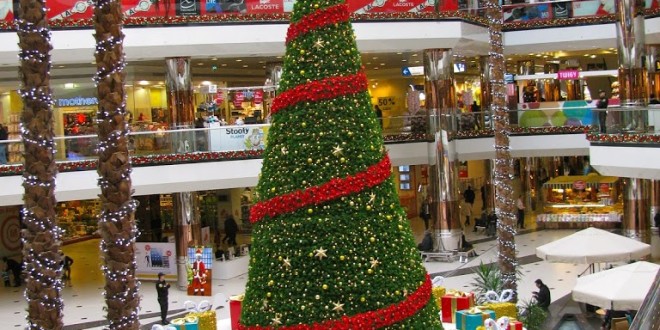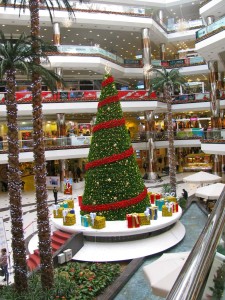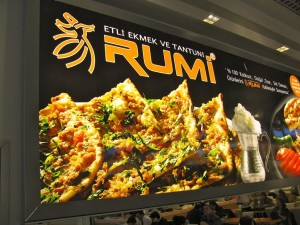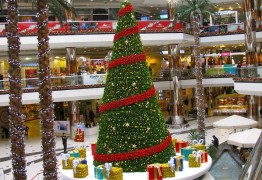It was a sunny day with temps in the high forties, but I started it in a bad mood, knowing I’d spend most of it hunting for Christmas gifts. I’ve been known to lament that Christmas is nothing but a part-time job for women each year, and this time it seems particularly onerous as we’re packing up to return to the U.S. As I left the house, I muttered to myself that if I became a Muslim, I wouldn’t have to Christmas shop.
In mid-morning, driver Umit took me to nearby Cevahir (pronounced Je VA hear) mall. To my surprise, he decided to accompany me to pick out Christmas ornaments but first, we paused to look at the mall decorations. The palm trees and poinsettia trim were impressive, but something didn’t feel quite right. Later, after looking at my photos, I realized I felt the same way inside Istanbul’s Hagia Sofia: inordinately tiny. I did some quick research and discovered that, with over a hundred thousand square meters of shopping area, Cevahir is actually twelve times as big as the Aya Sophia. Wow.
Cevahir has six levels of retail shops. Like other Turkish malls, as you ascend, the merchandise becomes more expensive. We stopped at Koctas, a home improvement store on the lowest level, and looked at Christmas decorations. I put some red and silver balls in the cart, and Umit insisted on some hot pink snowflake ornaments, I mentioned needing a Christmas tree skirt, and I’m not sure Umit understood the concept, but he gamely asked the clerk, who replied that that item had not come in yet.
While waiting in a rather long line to pay, Umit asked me which days of the Christmas season are most important. He listened intently, and then said he thought Christmas encompassed the entire week before January 1.
“Ah, well you’re not alone,” I told him. “Last year at work, people kept wishing me Merry Christmas on the 26th, 27th, and 28th, and I had to keep telling them Christmas was over.”
“Because we don’t know,” he replied. (The biggest Muslim holiday of the year involves nearly a week of observance.)
He then asked about candles, and I replied that yes, we often light candles on Christmas. But then I realized he meant lighting a candle for someone in church. I explained that was a Catholic practice, and he told me that one of his Turkish friends also goes to church and lights candles for people.
We stopped at Migros, a supermarket chain, to ask about tree skirts, but received the same “they haven’t arrived yet” answer. I wondered if that was simply a pat response, a way of saving face in front of a foreigner obviously more knowledgeable about Christmas arcana.
As we walked back into the mall we passed a kiosk selling chocolates, and I noticed a possible stocking stuffer, which I will keep secret. The young woman at the kiosk, her hair wrapped in a beige scarf, greeted us with a smile and handed us each a sample in a tiny cardboard gift box.
We ended up standing and chatting with her. She wanted to know where I was from, and then where exactly in America. Minnesota wasn’t familiar to her, but she said her cousin was studying in Santa Barbara. “Oh, that’s a really good place,” I told her.
“Where should I go in America?” she asked.
Hmm. What to say. “Ah, do you like cold weather?”
She didn’t answer that, but instead began telling me how difficult it was for her to find a job in Istanbul. “My major was broadcasting and communications,” she began. “I call and arrange job interviews without any problem, but when they see me, they tell me they won’t hire me because of my headscarf.”
The three of us talked about the situation for “covered women” in Turkey and in the U.S., and I ended up giving her my business card and telling her to get in touch if she had any more questions. She thanked us, and reached under the counter for a few more chocolate samples.
I walked away pleased, commenting to Umit that I almost never get the chance to talk with headscarfed women.
Umit then went on his way, and I proceeded to make the rounds of stores on each level. Zara Home, a Spanish chain, was playing a jazzy version of Jingle Bells. At British Debenham’s, I picked up a few men’s items, one with the brand name, “Maine.”
Just after noon I headed up to the fifth level for lunch at a wonderful pide (PEA day) place Angela and I discovered this past summer. Pide is a lot like pizza, only without the tomato sauce, but today I ordered a lamb kavurma sandwich. It involves rich, roasted lamb and chopped up tomatoes, onions and spices in a delicate, crispy bun.
After lunch and more shopping, I stopped at Starbucks. I had been telling Umit about the coffee chain’s holiday peppermint and pumpkin lattes, but he said he hadn’t seen them. He was right: they weren’t on the menu. I sat down on a velvet upholstered chair and sipped an ordinary latte, munching on the gift chocolates, and listening as a Beach Boys tune and then Frosty the Snowman played. Two Arabic-speaking men sat down at the next table.
My last surprise of the day was wrapping paper in individual sheets at a shop called Notebook. There’s a general dearth of wrapping materials here, and I’ve been hoarding anything that might cover a gift, but most of what I have is shiny, plasticky foil and isn’t at all Christmas-y.
I haven’t quite completed my Christmas “job,” but I’ve made a significant dent. Not a bad day. And not a bad-mood-day at all







I have lived here nigh on 30 years and I still find that Turks still don’t get it: they confuse Christmas with New Year. It’s incredible. Some of my dearest Turkish friends still ring me apologetically and ask when ‘my’ Christmas is! Lovely post,Sue, thank you..
True, but if you were a Muslim, no doubt you would have to shop and cook for other holidays!